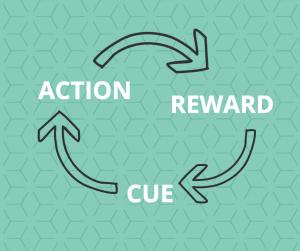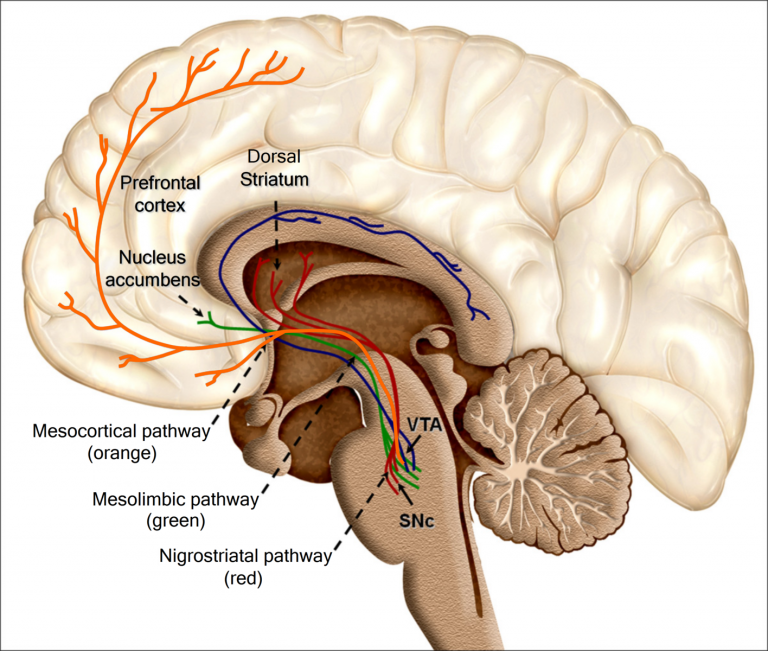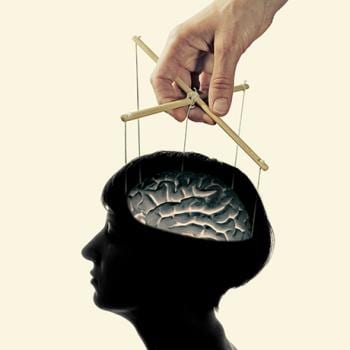Welcome back to my series on neuroscience and personal growth. At this point, we’ve established that New Year’s Resolutions are ineffective and often counterproductive. And we know that that the sustainable way to reach your goals is through building habits.
Last week, we talked about the first science-backed key to habit formation: start small and be consistent. In other words, use microhabits.
Today, we’re going to cover the second key to habit formation: cue and reward. We typically think about personal change in terms of motivation (“do you want it enough?”) and willpower (“are you strong enough?”). But in order to rewire your neuronal circuits, you should rely on cues (“what’s the trigger?”) and rewards (“how is it reinforced?”) instead. This is probably counterintuitive to many of my readers, so I’ll take a minute to unpack why motivation and willpower won’t get you far.
Don’t rely on motivation and willpower
Motivation appears to drive much of our human behavior. And to a certain extent, this is true: we act according to our motivation for desired outcomes. However, the strength of our desire to perform well — the strength of our motivation — is not fully predictive of performance. It doesn’t guarantee success. And when you fail, high motivation generates feelings of discouragement and guilt, which do not reinforce your new behavior. So relying on motivation alone won’t help you make and break habits.
And willpower won’t either. The concept of willpower, in the field of psychology, is fraught with difficulty. Self-control was once equated to willpower, a limited resource spent through use. This phenomenon, called ego depletion, was the justification for addiction and other “lapses” of self-control. But similar to a muscle that fatigues, willpower was thought to grow stronger through use.
However, this understanding of willpower depletion is backed by little evidence. And furthermore, researchers now understand that self-control is a multifaceted phenomenon, much more complex than mere willpower. Among other things, self-control depends on one’s sense of self-efficacy, one’s cognitive skills (such as distraction), and one’s self-monitoring abilities.
What does this mean? Self-control shouldn’t be thought of as a muscle. Rather, meaningful self-control arises in the context of your existing beliefs, skills, and behaviors. As a result, relying on willpower alone is an inefficient (and often ineffective) way to enact personal change.
So instead of trying to produce a habit out of thin air with motivation and willpower, use cues and rewards.

What are cues?
Cues are triggers for you to perform your desired behavior.
Returning to the basics of brain structure, neurons are organized in circuits. To activate a circuit — and produce the relevant behavior — you need to fire neurons that communicate with the circuit. One way to do this is through context cues. These might include aspects of your environment, other people, or actions that precede the behavior. Exposure to these cues might be deliberate, like when putting on your workout clothes activates thoughts about going to the gym. Exposure might be inadvertent, like when seeing a McDonald’s ad activates a craving for a burger. Either way, the cue is an existing neural network that fosters the activation of your new circuit.
This means that, to form a new habit, you should attach it to an existing one that can serve as your cue. For instance, every time you brush your teeth at night, think of 5 things you’re grateful for. In this way, you don’t have to pull the new behavior out of thin air: the cue will trigger your brain to go down that path. Every time you brush your teeth, you’ll find yourself experiencing gratitude. Eventually, the cue will be enough for you to generate the response of your desired behavior.
So to form habits, the first component is start with cues.
What are rewards?
The second component is the reward.
Every existing habit was once reinforced by a reward. You learned to habitually skip a broken step because of the reward of keeping your footing. While driving, you learned to release the clutch slowly because of the reward of avoiding a stall. You learned to floss daily because of the reward of clean, white teeth (or a happy dentist).

Rewards activate the dopamine system in your brain. Dopamine is the neurotransmitter involved in addictive things like drugs and food. Contrary to popular belief, dopamine doesn’t actually make you feel good; it doesn’t generate a ‘high.’ But dopamine does reinforce the behavior, which makes it addictive. Dopamine increases the likelihood that your brain will repeat whatever it was that caused dopamine’s release. In the case of habit formation, rewards help you stick to your desire for change, because your brain will crave dopamine release.
So after you set a goal, choose a way to reward yourself. This can be something like eating your favorite food or listening to your favorite. It could even be as simple as a smile. Whatever it is, reward yourself after each time you perform your new behavior.
A well-traveled path to holiness
Just like with microhabits, this reflects how the Church strives to educate us in holiness. She uses both cues and rewards to help us grow in virtue, to deepen our prayer life and sacramental life. Just think of how, for centuries, the ringing of the noon bell was the cue for everyone to stop work and pray the Angelus. Or think of how the sacrifices of Lent are followed by feasting and celebration at Easter, providing a reward for your discipline of the flesh in pursuit of virtue.
Find the rest of this series here.
Further reading recommendations
For anyone who wants more examples of what this looks like in practice, Charles Duhigg’s The Power of Habit is a good resource.












